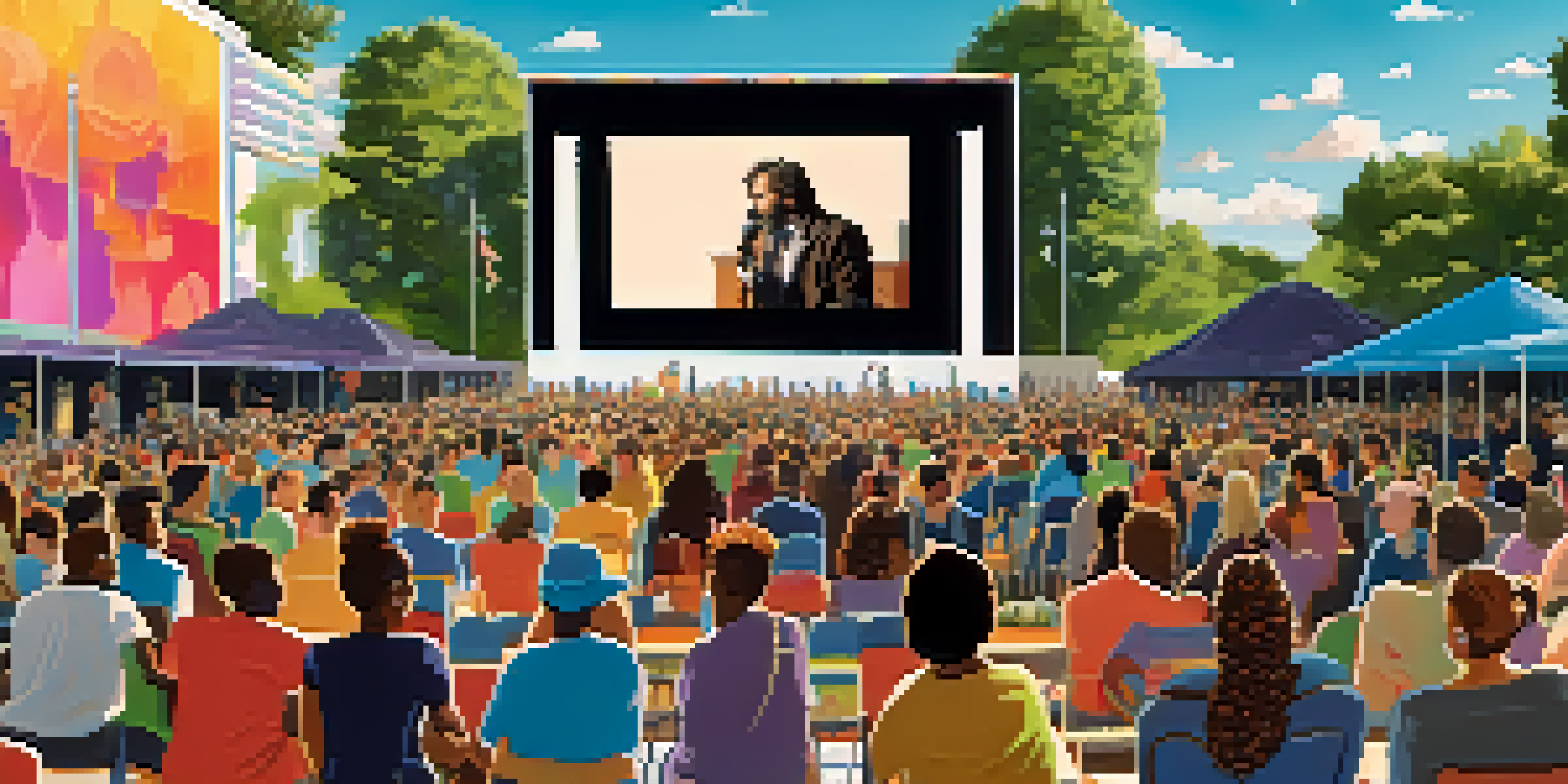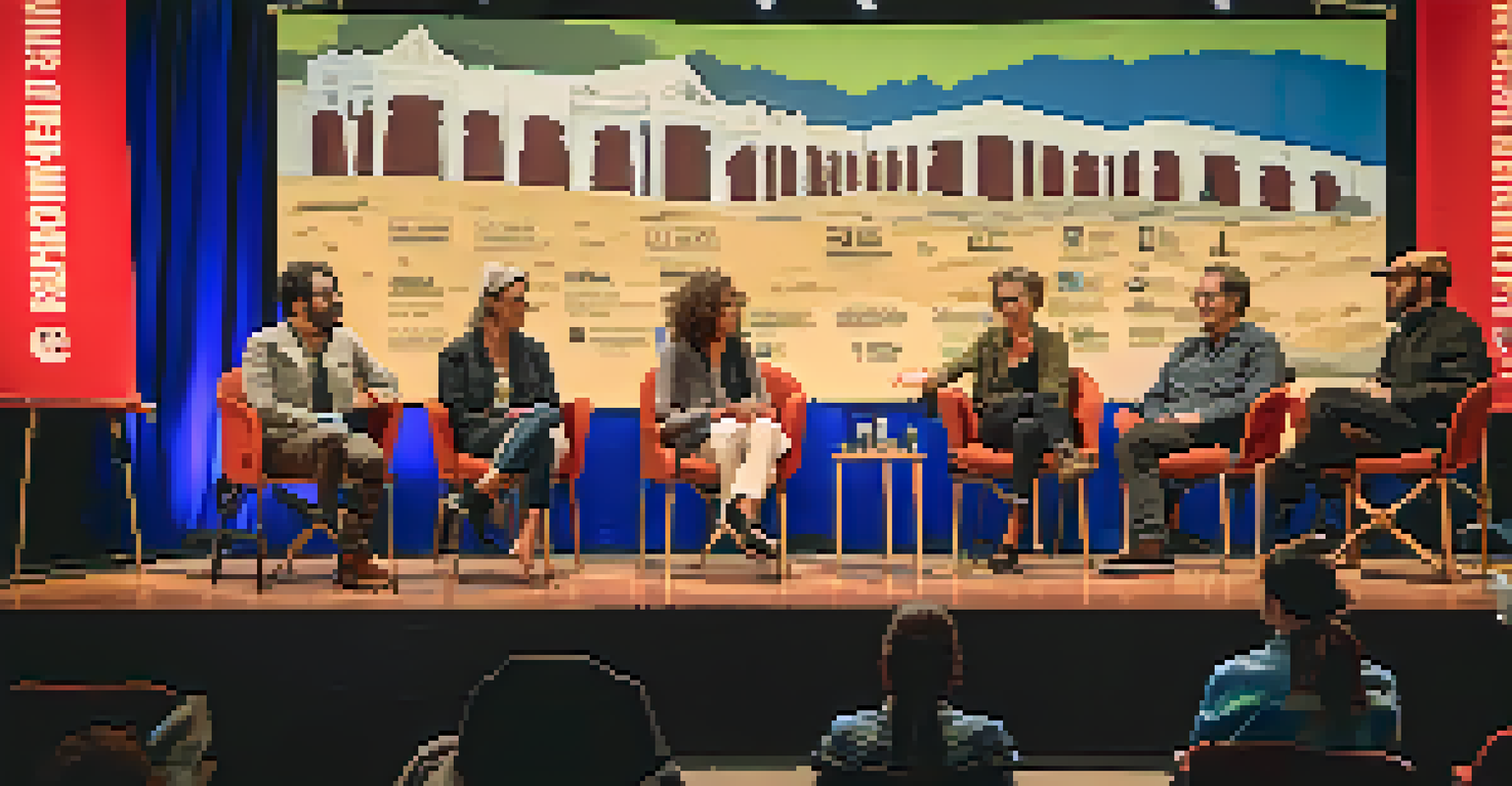How Film Festivals Shape Audience Expectations in Hollywood

The Role of Film Festivals in Shaping Film Culture
Film festivals serve as cultural landmarks, showcasing diverse perspectives and innovative storytelling. They provide a platform for filmmakers to present their work while attracting an audience eager for fresh narratives. This cultural exchange often sets the stage for what audiences will expect from mainstream Hollywood films moving forward.
Film festivals are a showcase for the world's best and brightest filmmakers, a place where new voices and new visions can be seen and heard.
By highlighting independent films and international cinema, festivals broaden the scope of storytelling, challenging the conventional narratives typically seen in commercial films. This exposure can lead audiences to seek deeper, more meaningful content, influencing their future viewing choices. As festival-goers experience these unique stories, their expectations for quality and originality increase.
Ultimately, film festivals act as a mirror reflecting societal issues and artistic trends, shaping what audiences deem valuable in cinema. As attendees engage with diverse films, their preferences shift, urging Hollywood to adapt and evolve in response. This dynamic relationship between festivals and audience expectations fosters a richer cinematic landscape.
Setting Trends: How Festivals Influence Film Production
Film festivals often set the trends that Hollywood filmmakers aspire to follow. For instance, if a particular style or theme resonates with audiences at a festival, studios may take note and incorporate similar elements into their upcoming projects. This ripple effect can lead to a wave of films that mirror the innovative approaches showcased at these events.

Moreover, festivals create buzz around certain films, sometimes leading to bidding wars among studios. This phenomenon not only elevates the status of independent films but also encourages Hollywood to invest in unique storytelling. As a result, the festival circuit can significantly impact production decisions within the industry.
Festivals Shape Film Culture
Film festivals showcase diverse perspectives, influencing audience expectations and inspiring Hollywood to evolve.
In this way, festivals become a breeding ground for new ideas and concepts that redefine audience expectations. As filmmakers experiment with unconventional narratives, audiences start to anticipate more daring and thought-provoking content. This shift in expectation can ultimately lead to a more vibrant and diverse film landscape.
Audience Engagement and the Festival Experience
Attending film festivals offers audiences a unique chance to engage with filmmakers and participate in discussions, creating a sense of community. This interactive experience fosters a deeper connection to the films being shown, as viewers gain insights into the creative process. The intimate setting allows for meaningful conversations, enhancing the overall appreciation of cinema.
The role of film festivals is to create a sense of community that goes beyond the films themselves, fostering connections among filmmakers and audiences.
Furthermore, these events often feature panels and Q&A sessions with directors and actors, providing audiences with a behind-the-scenes look at filmmaking. This access can elevate expectations, as viewers begin to anticipate not just the films themselves but also the stories and passion behind them. The more audiences understand the art of filmmaking, the more discerning they become.
Ultimately, the festival experience cultivates an informed audience that seeks out films that challenge the status quo. This demand for authenticity and depth influences Hollywood to produce content that resonates on a more personal level. As a result, the cycle of expectation and engagement continues to evolve.
The Impact of Awards on Audience Perception
Awards presented at film festivals can significantly impact audience perceptions and expectations. When a film wins accolades, it garners attention and credibility, making viewers more inclined to seek it out. This phenomenon illustrates how festivals not only showcase films but also create a hierarchy of recognition that shapes audience preferences.
Moreover, award-winning films often set benchmarks for quality and creativity, challenging Hollywood to elevate its offerings. Audiences start to expect a certain level of artistry from films that have been celebrated at festivals, pushing mainstream productions to adopt more innovative approaches. This dynamic can lead to a richer cinematic experience as filmmakers strive to meet heightened expectations.
Awards Drive Audience Interest
Accolades from festivals elevate films' profiles, shaping viewer perceptions and pushing filmmakers toward higher quality.
In essence, festival awards act as a guiding light for audiences navigating their viewing choices. As films gain recognition, audiences become curious about the storytelling and production quality that led to such accolades. This curiosity drives them to explore films that align with their new expectations.
Diversity and Representation: A Festival Focus
Film festivals have increasingly emphasized diversity and representation, reflecting the changing landscape of audience expectations. By showcasing films from underrepresented voices, festivals challenge Hollywood to broaden its storytelling horizons. This shift encourages audiences to seek out and support films that resonate with their own experiences.
As viewers become more aware of the importance of representation, their expectations evolve. They begin to demand stories that reflect a variety of perspectives, ultimately pushing Hollywood to diversify its offerings. This cultural shift signifies a growing recognition of the power of storytelling in shaping societal narratives.
In this way, film festivals play a crucial role in promoting inclusivity within the film industry. By elevating diverse voices, they not only enrich the cinematic landscape but also inspire audiences to seek out films that challenge traditional norms. This evolution in expectations fosters a more inclusive and enriching film experience for everyone.
The Role of Social Media in Festival Buzz
In today's digital age, social media plays a pivotal role in shaping audience expectations around film festivals. As attendees share their experiences and reactions in real-time, the buzz generated online can elevate a film’s profile significantly. This instant feedback loop allows audiences to connect with films before they even hit the mainstream market.
Platforms like Twitter, Instagram, and TikTok have become essential tools for festival-goers to express their thoughts and recommendations. This social engagement not only amplifies the excitement surrounding specific films but also creates a sense of community among viewers. As a result, audiences are often influenced by the opinions of their peers, shaping their expectations before they even enter a theater.
Social Media Amplifies Festival Buzz
Digital platforms enhance audience engagement with films, transforming how viewers interact and form expectations.
Ultimately, social media transforms how audiences engage with cinema, making them more active participants in the film discourse. With the ability to share insights and recommendations, viewers start to develop a heightened sense of what constitutes a quality film. This shift in audience behavior continues to mold expectations within Hollywood.
Future Trends: What Lies Ahead for Film Festivals
As the film industry evolves, so too will the role of film festivals in shaping audience expectations. With the rise of streaming services and changing viewing habits, festivals may need to adapt to remain relevant. This evolution could involve more hybrid models that combine in-person events with virtual experiences, reaching broader audiences.
Moreover, the increasing emphasis on sustainability and social responsibility may influence the types of films showcased at festivals. Audiences are likely to expect films that address pressing global issues, prompting festivals to curate content that reflects these values. This shift may lead to an even greater focus on films that inspire change and provoke thought.

In conclusion, the future of film festivals promises to be dynamic, as they continue to influence audience expectations in Hollywood. By embracing new technologies and societal shifts, festivals will play an integral role in shaping the cinematic landscape for years to come. As audiences become more engaged and discerning, the impact of these festivals will only grow stronger.